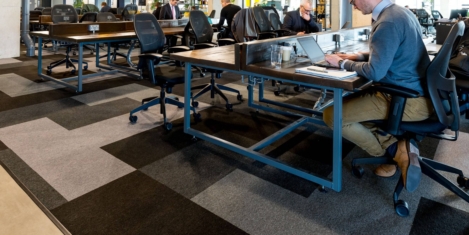July 11, 2018
Katrina Kostic Samen confirmed as President of the British Council for Offices
 The British Council for Offices (BCO) today welcomes Katrina Kostic Samen as its new President. Katrina Kostic Samen, Founder and Managing Partner at KKS Strategy, formally takes over the position from Ken Shuttleworth, Founding Partner of Make Architects, at the BCO’s Annual General Meeting in London today, Wednesday 11th July. As Chair of the BCO Annual Conference held earlier this year in Berlin, Katrina set out the vision for her Presidential year, challenging delegates to look at the workplace from multiple occupier perspectives, and to ensure that they are designing and delivering offices which are inclusive and provide for a diverse workforce.
The British Council for Offices (BCO) today welcomes Katrina Kostic Samen as its new President. Katrina Kostic Samen, Founder and Managing Partner at KKS Strategy, formally takes over the position from Ken Shuttleworth, Founding Partner of Make Architects, at the BCO’s Annual General Meeting in London today, Wednesday 11th July. As Chair of the BCO Annual Conference held earlier this year in Berlin, Katrina set out the vision for her Presidential year, challenging delegates to look at the workplace from multiple occupier perspectives, and to ensure that they are designing and delivering offices which are inclusive and provide for a diverse workforce.











 The majority of employees are disappointed with their company’s lack of investment in technology, and despite the fact three quarters (76 percent) want to request flexible working – almost half still don’t have the option of working more flexibly, a new report from a technology company claims. According to the survey by technology company Ingram Micro Cloud UK, in collaboration with technology company Microsoft, despite the fact that Millennials and Centennials are often thought to be the driving force behind changing workplace practices – and are often derided in popular discourse for having unreasonable and unrealistic expectations – the calls for change are coming from all segments of the workforce. However, 85 percent of Millennials admit to procuring their own workplace technologies such as instant messaging, Skype, file hosting and sharing tools (all available from Ingram Micro Cloud) that aren’t supported or provided by their employer, which raises major security issues, acco.
The majority of employees are disappointed with their company’s lack of investment in technology, and despite the fact three quarters (76 percent) want to request flexible working – almost half still don’t have the option of working more flexibly, a new report from a technology company claims. According to the survey by technology company Ingram Micro Cloud UK, in collaboration with technology company Microsoft, despite the fact that Millennials and Centennials are often thought to be the driving force behind changing workplace practices – and are often derided in popular discourse for having unreasonable and unrealistic expectations – the calls for change are coming from all segments of the workforce. However, 85 percent of Millennials admit to procuring their own workplace technologies such as instant messaging, Skype, file hosting and sharing tools (all available from Ingram Micro Cloud) that aren’t supported or provided by their employer, which raises major security issues, acco.










 Nearly half of UK managers (45.1 percent) are ill-prepared for the role, and a quarter (25 percent) of employees say their manager does not have the right skills for effective management, claims new research by Bridge by Instructure. The study, based on interviews of 1,000 managers and employees across the UK on their attitudes towards both management and learning and development, revealed that more than half of those who responded (53.4 percent) think managers need more training to perform as a manager and, almost half (45 percent) think managers need to be given time to operate as a manager rather than having those responsibilities ‘bolted on’ to their existing role.
Nearly half of UK managers (45.1 percent) are ill-prepared for the role, and a quarter (25 percent) of employees say their manager does not have the right skills for effective management, claims new research by Bridge by Instructure. The study, based on interviews of 1,000 managers and employees across the UK on their attitudes towards both management and learning and development, revealed that more than half of those who responded (53.4 percent) think managers need more training to perform as a manager and, almost half (45 percent) think managers need to be given time to operate as a manager rather than having those responsibilities ‘bolted on’ to their existing role. 










July 11, 2018
A beauty industry veteran makes the case for corporate wellness
by Leena Jain • Comment, Wellbeing, Workplace design
(more…)